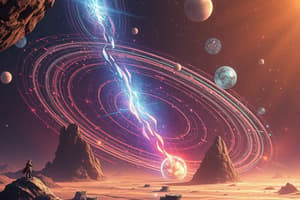Podcast
Questions and Answers
What did Albert Einstein's theory of general relativity replace?
What did Albert Einstein's theory of general relativity replace?
- Einstein's theory of special relativity
- Newton's action-at-a-distance concept (correct)
- Quantum mechanics
- The concept of spacetime
According to general relativity, why do massive objects distort the fabric of space and time around themselves?
According to general relativity, why do massive objects distort the fabric of space and time around themselves?
- To maintain a stable orbit around the objects
- To prevent the escape of light particles
- To remain stationary in spacetime
- To create a warped landscape for other particles to follow (correct)
What do gravitational waves result from, according to Einstein's general theory of relativity?
What do gravitational waves result from, according to Einstein's general theory of relativity?
- The interaction between matter and antimatter
- The formation of neutron stars
- The curvature of light around massive objects
- Accelerated masses bending spacetime into ripples (correct)
Which observatory confirmed the existence of gravitational waves since 2015?
Which observatory confirmed the existence of gravitational waves since 2015?
How does general relativity provide a foundation for the Big Bang model?
How does general relativity provide a foundation for the Big Bang model?
What is a characteristic of black holes according to general relativity?
What is a characteristic of black holes according to general relativity?
According to Newton's law of universal gravitation, the force between two objects is proportional to which of the following?
According to Newton's law of universal gravitation, the force between two objects is proportional to which of the following?
What does the gravitational constant 'G' represent in Newton's law of universal gravitation?
What does the gravitational constant 'G' represent in Newton's law of universal gravitation?
Why did astronomers realize Newtonian gravity had limitations when observing distant stars?
Why did astronomers realize Newtonian gravity had limitations when observing distant stars?
What would happen to the gravitational force between two objects if the distance between them is doubled?
What would happen to the gravitational force between two objects if the distance between them is doubled?
Which aspect of his law of universal gravitation led Newton to predict planetary motions within our solar system?
Which aspect of his law of universal gravitation led Newton to predict planetary motions within our solar system?
What issue with Mercury's orbit challenged Newton's theory of universal gravitation?
What issue with Mercury's orbit challenged Newton's theory of universal gravitation?
Flashcards are hidden until you start studying
Study Notes
Understanding Gravitation
Gravitation is one of the fundamental forces shaping our Universe — it's familiar yet enigmatic, permeating every aspect of life on Earth while remaining mysterious when we venture beyond our planetary neighborhood. This article aims to explore gravitational concepts with clarity and simplicity.
Newtonian Gravity
Sir Isaac Newton was among the first scientists to recognize gravity's influence through his celebrated law of universal gravitation. According to Newton, any two objects attract each other with a force proportional to their masses and inversely proportional to the square of the distance between them:
[ F = \frac{G m_1 m_2}{r^2} ]
Where (F) represents the attractive force (commonly known as weight), (m_1) and (m_2) represent the masses of the interacting bodies, (r) denotes the distance separating those bodies, and (G) refers to the gravitational constant ((6.674 x 10^{-11}) N m²/kg²).
Newton's theory explains why apples fall from trees, how satellites orbit the Earth, and even offers reasonable predictions regarding the behavior of planets within our solar system. However, its shortcomings emerged once astronomers began to probe the cosmos more deeply; issues like Mercury's erratic orbit and observations indicating discrepancies when estimating the mass of distant stars necessitated a new understanding of this ancient concept.
Einstein's Theory of General Relativity
Albert Einstein revolutionized our viewpoint of gravity by proposing general relativity, which replaced Newton's action-at-a-distance conception with a curvature of spacetime itself. In essence, massive objects distort the fabric of space and time around themselves, creating a warped landscape that other particles follow due to inertia—their path of motion reflects the geometry of curved spacetime rather than being pulled directly toward anything.
Accordingly, gravitational waves result from accelerated masses bending spacetime into ripples. These waves carry energy away from violent events such as collapsing neutron stars or merging black holes. The Laser Interferometer Gravitational Wave Observatory (LIGO) has confirmed the existence of these elusive phenomena since 2015, ushering us into a brand-new era of experimental astronomy.
General relativity also provides a foundation for the Big Bang model, explaining the expanding universe's origin and subsequent evolution. Furthermore, it predicts black holes – dense stellar remnants whose extreme gravitational pull traps everything that comes too close, including light.
In summary, gravitation remains central to many scientific disciplines and continues to inspire creativity and curiosity across the world. Its intricate interconnectedness with physics, mathematics, astrophysics, cosmology, and engineering keeps researchers captivated by its mysteries.
Studying That Suits You
Use AI to generate personalized quizzes and flashcards to suit your learning preferences.




